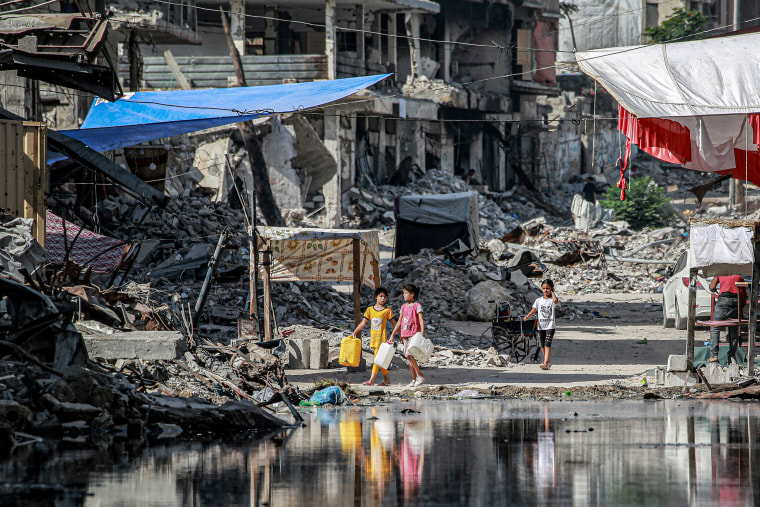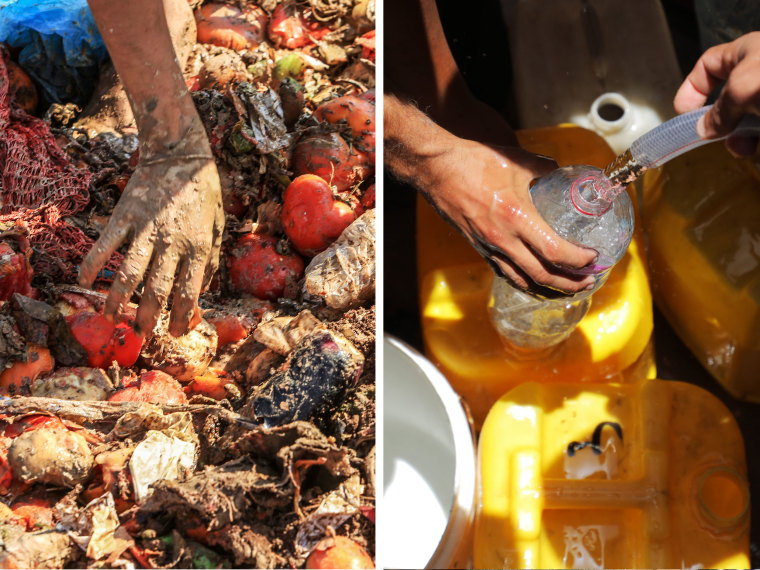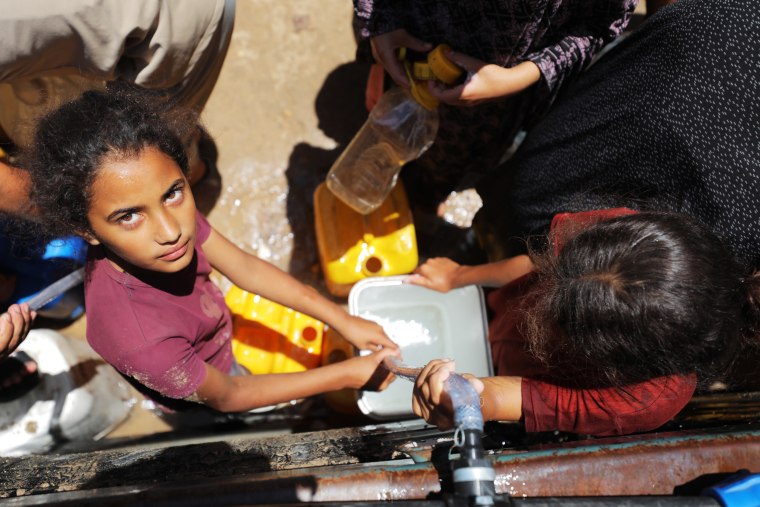Like clockwork each morning in Muwasi, a coastal town in southern Gaza designated a “safer” zone by the Israeli military, scores of children can be seen walking, almost as if they’re heading to school.
But instead of books, they're carrying jerrycans, waiting for hours in long lines at water stations. Under the blazing summer sun, they hope to secure clean drinking water for themselves and their families.
“It’s the morning routine,” Louise Wateridge, a spokesperson for UNRWA, the United Nations agency for Palestinian refugees, told NBC News in a phone interview Wednesday from nearby Khan Younis. “Children are carrying water the weight of themselves back to their shelters,” she said, adding that they can often spend as much as six to eight hours trying to collect both food and water.
Officials said in a statement Monday on Facebook that just 10 miles to the north of Muwasi, in the municipality of Deir Al-Balah, facilities serving “more than 700,000 people” with water were effectively “out of service.”
They added that 19 water wells and two water tanks had “completely stopped working” after they ran out of fuel. “We call on all citizens to keep what they have left in their private tanks,” the municipality said, urging a “spirit of cooperation and participation.”
Separately, Mahmoud Basal, a spokesman for Gaza’s Civil Defense, the government agency that manages emergency services and rescue in the Hamas-run enclave, took to Telegram on Tuesday to warn of a “complete stoppage of all water wells and tanks” in Deir Al-Balah “due to the exhaustion of fuel needed to operate them.”

He also warned that the situation was becoming increasingly dire in northern Gaza, saying desalination plants in and around Gaza City had been forced to halt operations “for the fifth day in a row.”
Two days later, the charity Oxfam International accused Israel of “systematically weaponizing water against Palestinians in Gaza” in a report. It said that Israeli forces had damaged or destroyed “five water and sanitation sites every three days since the start of this war.”
A 'scarce' resource
Almost 39,000 Palestinians have been killed in Gaza, according to local health officials, since Israel launched its military offensive in the enclave following Hamas' Oct. 7 attack, in which some 1,200 people were killed and around 250 taken hostage, according to Israeli tallies.
As fighting continued, Gaza's Health Ministry reported Wednesday that at least 81 people had been killed and almost 200 injured in Israeli strikes within a 24-hour period. UNRWA said at least eight schools had bee hit in strikes within the span of just 10 days.
The strikes came amid ongoing efforts to negotiate a cease-fire between Israel and Hamas to bring an end to the fighting. State Department spokesman Matthew Miller said in a briefing Wednesday that the U.S. continued to be “optimistic” over progress made in the talks, but said there were still issues to be hammered out.
In the meantime, food and water have become increasingly difficult to obtain in Gaza.

UNRWA also estimated last month that almost 70% of water and sanitation facilities and infrastructure had been destroyed or damaged in Israel’s bombardment, and Waterbridge said trucks like the one in Muwasi were few and far between.
As well as desalination points failing, she said, adding that at least five of the seven water wells that had been operating in Jabalia in northern Gaza were out of action.
Inside the large refugee camp in Jabalia, Amer Alian told NBC News’ crew on the ground Monday that he was struggling to find the most basic provisions.
“How can an ordinary citizen live? He can’t find food or water to drink like normal humans,” he said, before calling on the international community to “have some mercy.”
The crew filmed other Palestinians, including children, filling up jugs with water from a truck transporting potable water to the area. One boy could be seen carrying four empty jerrycans toward the truck, hoping to fill them with water as a little girl raced behind him carrying two containers.
Asked to comment on growing concerns around access to water in the enclave, the Israel Defense Forces referred NBC News to COGAT, the Israeli military body that oversees aid distribution in Gaza, which did not respond to a request for comment.
‘Risk of disease’
Humanitarian groups operating in the Gaza Strip have warned for months of the serious health threat posed by a lack of clean drinking water and by the buildup of untreated sewage in Gaza in the midst of the summer heat.
And an analysis conducted in May by the Global Nutrition Cluster of the World Health Organization found that almost 90% of children under the age of 5 in the enclave were affected by one or more diseases, and 52% had suffered with diarrhea in the past two weeks, as it warned that household access to safe water remained limited.

WHO spokesman Christian Lindmeier said in a phone interview Wednesday that the lack of consistent access to clean water posed a serious risk of dehydration and the spread of disease, including diarrheal disease, in the enclave.
“Access to water is ... basic to human life,” he said. “Unsafe drinking water can really be a death sentence.” Although cholera was not present in Gaza, “acute diarrheal disease is just as dangerous,” he added.
Wateridge, of UNRWA, said disease was “spreading everywhere,” amid difficulties disposing of garbage, treating sewage and delivering clean water, as well as humanitarian aid and basic hygiene products, after months of a devastating war.
“The conditions they are living in are appalling,” she said. “There’s no hygiene ... people are telling us they have nothing to wash with.”
With many forced to save whatever clean water they can access for drinking, Wateridge said a growing number of Palestinians were turning to using seawater for cooking and cleaning, despite the fact that untreated sewage is being pumped into the Mediterranean Sea with wastewater treatment plants shut down.
“They know the water from the sea is not hygienic in any state,” she said. Using it, she said, is “an act of desperation.”
